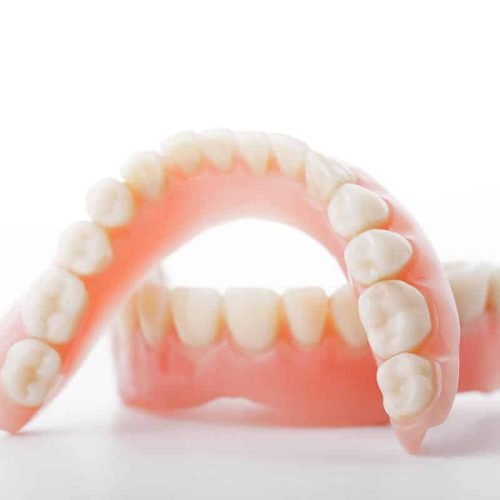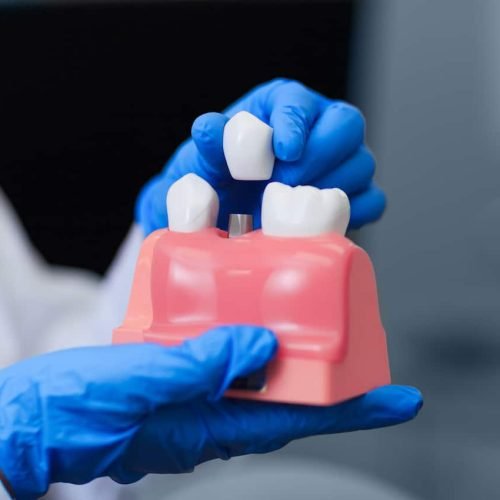IMPLANTS VERSUS DENTURES
Traditionally, removable dentures have served as the primary means of smile restoration in cases of significant tooth loss, particularly loss of all of the teeth on the upper and/or lower jaw.
Dental Implants Cleveland
Implants Versus Dentures
Traditionally, removable dentures have served as the primary means of smile restoration in cases of significant loss of natural teeth. Particularly, loss of all of the natural teeth on the upper and/or lower jaw.
Undergoing dental implant placement instead of opting for removable dentures has become an increasingly popular option for tooth replacement. One of the primary reasons for this is that dental implants provide a long-lasting solution. A dental implant is inserted into the jawbone in the area of the missing tooth. Thereafter, the bone around the newly placed implant must heal tightly around the implant. While bone healing requires time, the results are well worth the wait. Fixed implant supported dentures are designed to last a lifetime with proper care and maintenance. Unlike dentures, which typically need to be replaced every 5-7 years.
In addition to providing a long-lasting solution, dental implants can also improve your oral health. Implant supported dentures help to preserve the jawbone and prevent bone loss, which can occur when teeth are missing. When teeth are missing, the jawbone can begin to deteriorate over time, which can lead to oral health problems. The dental implant solution will act as an artificial replacement for the root of your tooth. Fixed implant dentures provide a stable foundation for replacement teeth, which helps to maintain the health of the jawbone.
Another benefit of implants is that they can restore your smile and boost your confidence. A dental implant or root is implanted into the jaw bone. This root is the support system for an artificial crown. The ‘tooth’ now looks and functions just like a natural tooth. Dental implants fill the areas where empty areas once existed, and as such significantly improves your smile. Your confidence will grow and you will no longer be ashamed to smile. Furthermore, dental implants create greater stability for chewing. Soon you will be able to eat all of the foods your were unable to chew because of missing teeth.
Advantages Of Implant Retained Dentures
Durability
Implant retained dentures are designed to fuse with the jaw bone, providing a stable and long-lasting foundation for replacement teeth. Better than removable dentures, they are extremely durable and can withstand normal biting and chewing forces. Removable dentures are prone to wear and tear over time and may need to be replaced more frequently.
Effectiveness
In terms of overall effectiveness, implant retained dentures are the clear winner. They look, feel, and function like natural teeth, and they provide a stable and long-lasting solution for tooth replacement.
Improved Speech
The implants are attached to the jawbone and allow for better speech and pronunciation. Normal dentures, which can slip and slide, can sometimes cause mumbling or slurring.
Bone Health
Dental implants stabilize the jawbone and help to prevent bone loss, while dentures can accelerate bone loss over time.
Maintenance
Implants require minimal maintenance and can be cleaned like natural teeth, whereas dentures require regular cleaning and may need to be removed at night.
Two Types Of Implant Supported Dentures
Bar-retained dentures
Bar-retained dentures are a type of implant that can help address many of the issues associated with regular dentures. Bar attached implant dentures use four dental implants to secure the prosthetic arch. These dental implants are made of titanium, so after Dr. Mike places them into the jaw, the surrounding bone material integrates with the implants. This provides a secure foundation for the denture.
A bar with horizontal lock attachments acts as a sort of fixed patient-removable prosthesis.
The bar-supported denture can be more desirable for patients than a traditional denture.
The bar allows for the denture to be removed and inserted as needed while offering more security than a conventional denture.
This type of denture is similar to a traditional denture but attaches directly to the jawbone using dental implants, providing more stability and better function.
Ball-retained dentures
The second option is known as ball-retained dentures. Ball-retained dentures, also known as implant-supported overdentures, provide higher stability and functionality than normal dentures. These use ball-shaped supports to connect the implants to the denture, making it easier to clean and to replace parts if necessary. This is particularly useful for individuals who are missing several teeth and need a partial denture.
A ball-retained denture uses ball-shaped supports to connect the implants to the denture.
This provides higher stability and more functionality than a traditional denture.
The ball attachments make it easier to clean and replace parts if necessary.
Ball-retained dentures are typically used when patients have good bone density and healthy gums.
Traditional Dentures
Traditional dentures are removable dental appliances that replace missing teeth.
Pros of traditional dentures:
Aesthetically pleasing: Dentures are designed to help fill out your facial profile and improve your appearance.
No surgery required: Unlike dental implants, dentures do not require surgery for placement.
Help to stop mouth from sagging inwards: Dentures can help maintain the structure of the mouth and prevent the face from sagging inwards.
Cons of traditional dentures:
Wear down and need to be replaced periodically: Dentures may need to be replaced every five to eight years.
Potentially require a lot of preparation: The process of getting dentures may require tooth removal, making molds, and fittings, which can be time-consuming and uncomfortable for some patients.
May cause sore spots and discomfort: This is a problem initially, as your mouth adjusts to the dentures.
May affect speech and eating: Speech and chewing habits may change as your mouth gets used to your new replacement teeth.
What To Expect
Implant retained dentures are a popular option for individuals who are missing several teeth and want a more stable and functional solution than traditional dentures. Factors that influence suitability for this surgery include the amount of jawbone available to support the implants, overall oral health, and the patient’s preferences.
The process of getting implant supported dentures involves multiple steps and can take months to complete. These steps may include damaged tooth removal, jawbone preparation (grafting), dental implants placement, bone growth and healing, abutment placement, and artificial tooth placement. The recovery time varies depending on the individual and the extent of the surgery.
Benefits from implant retained dentures, include a more natural and effective bite and reduced pressure on the gums. Unlike traditional dentures, an implant supported denture also improves chewing and speaking abilities. Overall, the implant supported denture option is a longer-lasting and more effective solution for tooth replacement. The patient’s quality of life is often improved because they can once again smile with confidence and eat whatever they want!







